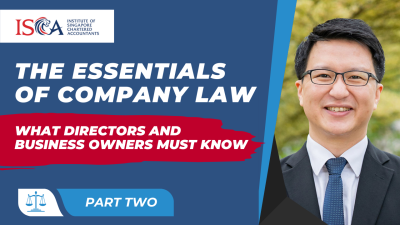Synopsis:
Directors stand in a very important position vis-à-vis the company. The management of the company is invariably entrusted to the directors who are usually vested with almost exclusive powers to manage the company. The opportunity for the abuse of these powers is therefore significant. Accordingly, the law has to impose duties on directors. The main source of duties imposed on the director in Singapore is the Companies Act. However, the Act expressly preserves duties that are imposed by the common law on directors. As such, directors’ duties are an amalgam of both statutory and common law.
Although it is very important to safeguard the company against the abuse of power by its directors, you should nevertheless remember that directors are also business people who are valued for their expertise in, for example, identifying good business opportunities. In practice, this fact gives rise to a very real tension in defining the boundaries of directors’ duties. On the one hand, the law disapproves of the director’s abuse of power; this may occur, for instance, when the director exploits a business opportunity that the company is interested in for his own benefit. On the other hand, imposing excessively strict duties on directors will have a chilling effect on their entrepreneurial initiatives. You should therefore be mindful that the law is constantly struggling to strike a balance between these competing concerns, as demonstrated by some of the “hard cases” that will be discussed in this module.
Part 2 of this module will cover the following areas:
The Essentials of Company Law - What Directors and Business Owners Must Know (Part 1) will cover the basic concepts of company law and directors' duties.
Intended For:
Competency Mapping:


